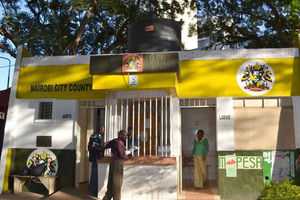
President William Ruto (centre), accompanied by athletes and pupils during the conferment of Eldoret town to City Status held at Eldoret Sports Club on August 15, 2024.
To what degree was the catastrophic debacle of the Eldoret statues accidental?
There is no basis to assert that a benighted committee of mouldy ‘city fathers’ convened with the explicit objective of procuring the most horrid inventory of grotesque effigies, as their bizarre method of celebrating native athletic prodigies, and commemorating the attainment of the status of a city under the Urban Areas and Cities Act.
It is, however, to suggest that, given certain facts about the county and the new city, it stands to reason that necessary conditions for a calamitous spectacle of organisational failure which is strongly suggestive of a broader systemic malaise, were not only present, but are a chronic, defining feature of local institutions.
In this case, it matters very little that no assemblage of bewildered burghers specifically requisitioned those revolting works; beyond a certain critical point, corruption is an inescapable morass of dysfunction and toxicity, in which the best intentions ineluctably transmogrify into harrowing nightmares that can traumatise entire nations.
This is the meaning of corruption: discrete delicts like bribery, theft, abuse of office and other forms of deleterious misconduct are merely symptomatic of underlying environmental deficiencies and fundamental structural distortions which make doing the right thing extremely difficult or positively perilous, while presenting corruption as easy, rewarding and more or less mandatory.
The foregoing is a broad outline of an institutional black hole into which the most ethically sound and strategically compelling initiatives are received, rapidly vandalised and haphazardly refurbished into lethal instruments of diabolical machinations and monstrously antisocial conspiracies.
Spectacular failure and large-scale harm proceed out of every nobly conceived action, and it may be said of the entirety of any implicated menagerie, that disaster cannot be helped.
The Eldoret statues are of a piece with other recent explosions of indignation, where ostensibly well-meaning programmes exited the black hole as repugnant outrages.
The most salient of them was the Finland saga, which was a student airlift programme gone irreparably awry.
As a consequence, many households fell into devastating insolvency, and hopeful students were abandoned to their devices as they pick up the mangled pieces of their aspirations, all because functionaries within the county government abused trust, committed grand theft and embezzled funds intended to enable students study abroad.
Consider also a couple of other programmes commenced, endorsed or condoned by local leadership, and inaugurated by private agencies, with the stated aim of facilitating young people to find job placements abroad, but which ended up as elementary iterations of advance fee fraudulent schemes, which once again rendered thousands of optimistic and trusting unemployed utterly destitute and disillusioned.
These scandalous eruptions are not dissimilar to periodic instances where hundreds of victims gather in horrified disbelief at the premises of sleek operatives who received millions of their savings, incomes and pensions in expectation of tantalising returns, only to vanish into the famously thin air of the region's high altitude, leaving them broke, ashamed and at their wits' end.
It would be offensively disingenuous to claim that Eldoret's flourishing notoriety as the emerging national hub for ‘wash-wash' fraudulent rackets is unconnected with more profound dynamics.
A unique feature of wash-wash, as earlier discussed, is the critical contribution of the police to the culmination of each scheme.
Similarly, the astonishing success of avaricious shylocks in dispossessing families of land depends on the complicity of officials in the lands registry, the judiciary and the police service.
Predatory lenders, who accept landed property as security for desultory sums lent to desperate families at rates as high as 60 per cent, are able to obtain summary judgment in the magistrates' courts ex parte, and to execute their decrees expeditiously, thanks to lands registry staff whose sole existence is dedicated to enabling the fruition of these predacious enterprises, and the police who are ever at hand to intimidate and evict victims.
Decades before its elevation to a city, Eldoret was punching far above its weight in the corruption sweepstakes, consolidating its reputation in the Ndung'u Report as the epicentre of stupendously egregious land grabbing.
As a newly enrolled advocate, I recall being perplexed by the fact that land on which important installations like the police station, fire station and the county council stood.
I still experience consternation at the memory of the coup de grace of these exploits: the High Court at Eldoret stood on land that had been acquired by a private entity.
It was not always this way. For long, Eldoret was highly reputed as a genteel , well-ordered university town at centre of a quietly productive farming region.
Its teaching hospital, which quickly became a national referral facility and East Africa's healthcare giant, constitutes the hub of a burgeoning biomedical industrial cluster. It was defined by delightful tales involving eccentric, amiable farmers and self-effacing world champions.
Today, it is arguably a jungle where corrupt, and fraudulent predators hold sway.When the Home of Champions stands before a mirror, it reflects the Home of Failure. That is what the statues said.
The writer is an advocate of the High Court of Kenya










